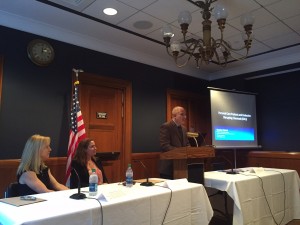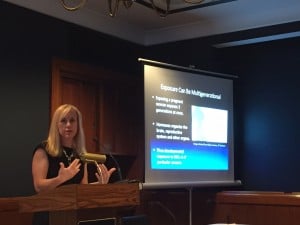Some chemicals in cosmetics and other personal products (shampoo, soap, toothpaste, etc.) have been linked to a variety of serious health effects in women, men, and children. Currently, the U.S. Food and Drug Administration (FDA) has very limited authority and resources to regulate cosmetics, so the agency is not screening for chemicals that could be harmful to the public’s health.

On September 16 the Endocrine Society joined with the Environmental Working Group (EWG) and the Society for Women’s Health Research (SWHR) to brief Senate offices about endocrine-disrupting chemicals that are contained in personal care products. The briefing, entitled, “Chemicals In Your Cosmetics May Be Hurting You” focused on how certain chemicals in our cosmetic products pose serious health risks and possible steps the Senate could take to better protect the public’s health.
Endocrine Society member and Professor at North Carolina State University,

Heather Patisaul, PhD, spoke at the briefing and explained how hormones work in the body and how exposure to certain chemicals can disrupt what they do.
Over the past several months, Endocrine Society members have worked with the office of Senator Dianne Feinstein (D-CA) on legislative efforts to improve the regulatory oversight of personal care products. On April 20, Senator Feinstein and Senator Susan Collins (R-ME) introduced S. 1014, the Personal Care Products Safety Act. The bill prioritizes several chemicals commonly used in personal care products for immediate review by the FDA. One of the priority chemicals, propyl paraben, is highlighted as an endocrine-disrupting chemical that can mimic estrogen and is “linked to a wide range of health effects, including reproductive system disorders.”

